Papers by Clare Hall
Palgrave Studies in Gender and Education, 2018
British Journal of Music Education, 2005
This article derives from a research project investigating the singing behaviour of a group of Au... more This article derives from a research project investigating the singing behaviour of a group of Australian boys in their first year of school. The project showed that the genesis of the ‘missing male’ trend in singing at school may be occurring in early childhood. The impact of hegemonic masculinity in early childhood is explored here by examining the intersection between this group of boys' perceptions of masculinity and their singing behaviours. Peer modelling was found to be an effective motivational ‘tool’ for improving singing behaviour and illustrates the importance of finding strategies to support boys' success in singing long before adolescence.

Bourdieu and the Sociology of Music Education, 2016
The aim of this chapter is to examine some of the pedagogies involved in producing the classical ... more The aim of this chapter is to examine some of the pedagogies involved in producing the classical musician’s habitus. Based on an ethnographic study of music conservatories in Israel, this discussion focuses on the student’s musical body, in the context of the instrumental music lesson, as the site for cultural reproduction and agency. The chapter begins by outlining some of the prominent critiques of conventional music pedagogies which are used to advance claims that instrumental teaching approaches are self-producing, overly technical and oppressive. Bourdieu’s theoretical tools are applied to frame a discussion about how the classical music field reproduces the ideal of virtuosity and high cultural capital through the performer’s habitus. An analysis of exchanges between conservatory teachers and their students illustrate that the disciplinary aspects of classical music pedagogy can also be read as more than merely constraining and conditioning the body to be obedient. By complimenting the concept of ‘habitus’ with Shusterman’s phenomenological view of the individual’s ‘bodily experience’, the argument is developed that learning classical musicianship is also personal, inventive and empowered. The findings, therefore, suggest that a classical musician’s education involves a ‘dual pedagogy’ that is simultaneously reproductive and agential.
Palgrave Studies in Gender and Education, 2018
British Journal of Music Education, 2010
Important note To cite this publication, please use the final published version (if applicable). ... more Important note To cite this publication, please use the final published version (if applicable). Please check the document version above.
Australian Art Education, 2014
This paper investigates a/r/tographic teaching and learning encounters with early childhood prese... more This paper investigates a/r/tographic teaching and learning encounters with early childhood preservice teachers undertaking an early childhood creative arts education unit of study. Through images and text we tell the story of how we came together as a virtual and embodied creative community. Using the flower as a provocation to undertake visual arts explorations that extended into drama, dance, music and arts-based performances, the students encountered issues in early childhood arts education through metaphor and metonym. Through the lens of artist/s, researcher/s and teacher/s this discussion reflects on the ways this approach enabled being, becoming and belonging in early childhood creative arts education.
International Journal of Art & Design Education, 2021

Health & Place
Connecting local citizens of different ages in productive social activity is considered a pathway... more Connecting local citizens of different ages in productive social activity is considered a pathway towards greater health. This research explores how older adults and young people interpret and access assets from their geographical community in relation to their well-being and the extent to which a process of intergenerational bridging contributes to the creation of additional assets for health. Data is presented from a process of place-mapping, interviews, observations and arts-based approaches to: a) understand how personal, social and community assets supported perceived health and wellbeing for the young children and older adults who participated; and b) explore the impact of intergenerational connection on enhancing social capital. The research utilised bonding, bridging and linking forms of social capital, across several interactions amongst 41 individuals who reside in the same geographical community (Victoria, Australia). Assets for health, common across generations and located within the same geographical community were identified. Social connections were strengthened through conversations, reflections and an integration of ideas facilitated through an arts-based approach. Findings suggest that through intergenerational connection and sharing of resources to support health, including the sharing of community assets, progress can be made towards community strengthening with implications for health and wellbeing.
Action, Criticism, and Theory for Music Education
A confluence is evident in the groups' agendas to promote meaningful action in the world, in and ... more A confluence is evident in the groups' agendas to promote meaningful action in the world, in and through music education. This introduction outlines how the contributors' work goes about this through critical research and practice that challenge the status quo in music education.
This paper investigates a/r/tographic teaching and learning encounters with early childhood prese... more This paper investigates a/r/tographic teaching and learning encounters with early childhood preservice
teachers undertaking an early childhood creative arts education unit of study. Through
images and text we tell the story of how we came together as a virtual and embodied creative
community. Using the flower as a provocation to undertake visual arts explorations that extended
into drama, dance, music and arts-based performances, the students encountered issues in
early childhood arts education through metaphor and metonym. Through the lens of artist/s,
researcher/s and teacher/s this discussion reflects on the ways this approach enabled being,
becoming and belonging in early childhood creative arts education.

This case study of generalist primary school teachers’ higher music education offers insights int... more This case study of generalist primary school teachers’ higher music education offers insights into the cultural and emotional resources that students bring to creative learning and the pedagogical practices which can mobilise these resources for creativity. By portraying the musical life stories of a group of Australian university students in their first year of studies, this chapter provides a counter-narrative to the derisive discourse that generalist pre-service primary school teachers are often deficient in a range of dispositions considered critical for teaching music in their future careers. Discussions about improving music education standards in schools often place the musical experience, skills, knowledge and self-confidence of generalist teachers as a key factor in the ‘problems’ with music in the school curriculum. However, these students’ narratives of experience illustrate how defining what are professional skills and knowledge for creative music teaching and learning is not so straightforward. I analyse the students’ reflections on their participation in a music education course that places group performance, digital musicianship, music composition and arts-based research methods as pillars of its pedagogies for creativity. The students’ accounts show how their self-perceptions of their musicality, everyday engagements with music and their simultaneously reproduce, question and disrupt dominant cultural narratives of musical creativity. I take a sociological view of the relationship between affect and creativity to explore what enables some students to overcome their anxieties about not being ‘good enough’ to create their own music. By adopting a Bourdieusian lens to examine the role of emotional capital in being and becoming music creators, I develop the argument some students have greater capacity to accumulate creative capital in music because of the degree of emotional capital they have at their disposal. This has implications for how we may better teach for creative learning with adults and I make recommendations for enabling students to increase their stock of emotional resources through reflexive teaching strategies.

In this chapter we discuss intensive mothering and concerted cultivation in relation to mothers’ ... more In this chapter we discuss intensive mothering and concerted cultivation in relation to mothers’ music practices. Based on a small-scale study of a group of Australian mothers and their experiences with their children’s formal early music education, we question how and why mothers participate in music with their young children. Early childhood studies have well documented the benefits of young children learning music (MacPherson) and sociology has long discussed the intensive labour mothers employ to mobilise their children’s social positioning through education (Reay, “Class Work”). But few studies investigate the particular contributions and experiences of mothers in regards to their children’s musical lives. This study contributes to growing critical discussions of intensive mothering (Ennis) by bringing into focus mothering and music. We argue that the forms of pedagogy performed by these musical mothers reinforce and complicate the cultural contradiction of intensive mothering.

The aim of this chapter is to examine some of the pedagogies involved in producing the classical ... more The aim of this chapter is to examine some of the pedagogies involved in producing the classical musician’s habitus. Based on an ethnographic study of music conservatories in Israel, this discussion focuses on the student’s musical body, in the context of the instrumental music lesson, as the site for cultural reproduction and agency. The chapter begins by outlining some of the prominent critiques of conventional music pedagogies which are used to advance claims that instrumental teaching approaches are self-producing, overly technical and oppressive. Bourdieu’s theoretical tools are applied to frame a discussion about how the classical music field reproduces the ideal of virtuosity and high cultural capital through the performer’s habitus. An analysis of exchanges between conservatory teachers and their students illustrate that the disciplinary aspects of classical music pedagogy can also be read as more than merely constraining and conditioning the body to be obedient. By complimenting the concept of ‘habitus’ with Shusterman’s phenomenological view of the individual’s ‘bodily experience’, the argument is developed that learning classical musicianship is also personal, inventive and empowered. The findings, therefore, suggest that a classical musician’s education involves a ‘dual pedagogy’ that is simultaneously reproductive and agential.

This chapter portrays the elision of gender and class in the making of choirboys’ musical habitus... more This chapter portrays the elision of gender and class in the making of choirboys’ musical habitus. The aim is to understand how some boys are able to overcome the gender delineation of being a choirboy as symbolically ‘feminine’. The chapter begins by outlining some of the persistent issues relating to the role gender plays in children’s music participation and, in particular, the troubling symbolic gender delineations that singing in a choir represents for many boys. A discussion follows about how and why some boys pursue choral singing, despite the gender ‘trouble’ this can generate, focusing on a close narrative analysis of what singing means for a group of Australian choirboys. To understand how these boys are enabled to become choirboys and what this musical habitus affords them, Bourdieu’s signature concepts, particularly habitus, are used to draw together sociological research in music and music education. By thinking about the choirboys’ musical narratives with Bourdieu’s theoretical tools, this chapter illustrates how the choirboys’ investments in taken-for-granted assumptions about the value of Western art music, certain forms of knowledge and the cultural and symbolic capital of the choirboy’s voice are strong features of this particular kind of musical habitus. The discussion concludes that it is the choirboys’ middle-class position, embodied in their musical tastes, knowledge and skills, which enables them to counter the dominant cultural narrative that this kind of singing is ‘feminine’.
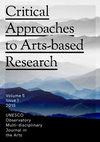
This article explores the productive intersection between arts-based research and the sociology o... more This article explores the productive intersection between arts-based research and the sociology of music education. The field of music education has been influenced in various ways by arts-based and arts-informed methodologies and methods; however, music-based methods are slow to be taken up by scholarship in general. As an attempt to redress this, I explore how creative music-making—primarily musical composition—can be deployed as an (auto)ethnographic method when conceptualised as a critical and multilayered form of narrative. I describe how I examine my pre-service primary school teachers’ musical identities and tease out some of their taken-for-granted notions about musicality by analysing the self-making performances in one student’s digital music composing. This discussion of her experiences raise fresh questions about how notions of musical creativity relate to our subjectivities and supports the broader argument that doing sociology with music has much to offer performance-based methods.
Related Websites by Clare Hall
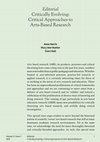
see full issue here: http://www.unescomelb.org/volume-5-issue-1-1/2015/9/14/00-editorial
ABSTRA... more see full issue here: http://www.unescomelb.org/volume-5-issue-1-1/2015/9/14/00-editorial
ABSTRACT:
Arts based research (ABR), its products, processes and critical theorising have come a long way in the past few years, nowhere more noticeably than in public pedagogy and education. Whether framed as arts-informed practices, practice-led research or applied research, it is certainly interesting times for those of us working at the nexus of arts, research and education. There has been an unprecedented proliferation of critical frameworks and approaches and we are continuing to move away from a defence of arts based research and its ‘validity’ and toward a celebration of this proliferation of diverse ways of knowing and doing research. This ‘coming of age’ particularly in arts based education research (ABER) opens new possibilities for critically theorising arts based research, and artfully doing critical investigation....
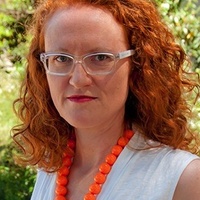





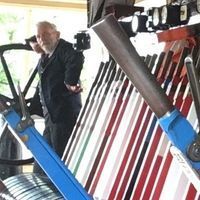
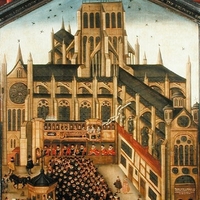

Uploads
Papers by Clare Hall
teachers undertaking an early childhood creative arts education unit of study. Through
images and text we tell the story of how we came together as a virtual and embodied creative
community. Using the flower as a provocation to undertake visual arts explorations that extended
into drama, dance, music and arts-based performances, the students encountered issues in
early childhood arts education through metaphor and metonym. Through the lens of artist/s,
researcher/s and teacher/s this discussion reflects on the ways this approach enabled being,
becoming and belonging in early childhood creative arts education.
Related Websites by Clare Hall
ABSTRACT:
Arts based research (ABR), its products, processes and critical theorising have come a long way in the past few years, nowhere more noticeably than in public pedagogy and education. Whether framed as arts-informed practices, practice-led research or applied research, it is certainly interesting times for those of us working at the nexus of arts, research and education. There has been an unprecedented proliferation of critical frameworks and approaches and we are continuing to move away from a defence of arts based research and its ‘validity’ and toward a celebration of this proliferation of diverse ways of knowing and doing research. This ‘coming of age’ particularly in arts based education research (ABER) opens new possibilities for critically theorising arts based research, and artfully doing critical investigation....
teachers undertaking an early childhood creative arts education unit of study. Through
images and text we tell the story of how we came together as a virtual and embodied creative
community. Using the flower as a provocation to undertake visual arts explorations that extended
into drama, dance, music and arts-based performances, the students encountered issues in
early childhood arts education through metaphor and metonym. Through the lens of artist/s,
researcher/s and teacher/s this discussion reflects on the ways this approach enabled being,
becoming and belonging in early childhood creative arts education.
ABSTRACT:
Arts based research (ABR), its products, processes and critical theorising have come a long way in the past few years, nowhere more noticeably than in public pedagogy and education. Whether framed as arts-informed practices, practice-led research or applied research, it is certainly interesting times for those of us working at the nexus of arts, research and education. There has been an unprecedented proliferation of critical frameworks and approaches and we are continuing to move away from a defence of arts based research and its ‘validity’ and toward a celebration of this proliferation of diverse ways of knowing and doing research. This ‘coming of age’ particularly in arts based education research (ABER) opens new possibilities for critically theorising arts based research, and artfully doing critical investigation....
The organizing committee of the 10th biennial International Symposium on the Sociology of Music Education and the Institute of Contemporary Music Performance are pleased to announce a call for papers. We welcome proposals from a broad range of perspectives, related to sociology and music education. Colleagues are invited to submit individual papers (twenty minutes, plus five minutes for discussion) or panels of three to five presenters (50 minutes, plus 10 minutes for discussion). Topics of particular interest include, but are not limited to, sociological studies of music education that relate to:
• Communities of musical practice
• Music, multimedia, and online learning
• Transdisciplinary, hybrid and sound-based music
• Power and (symbolic) violence
• Aspiration and social mobility
• Social justice and citizenship
• Feminist, gender, queer and trans theories
• Punk, hip-hop and anarchist pedagogies
• Critical studies of creativity
• Practice-led and arts-based research methods
• Music making, leisure, cultural participation
• Intergenerational learning, health and creative aging
• Internationalization and globalization
• Neoliberalization of schooling and higher education
• Public–private partnerships
• Religion and spirituality
• An age of polarized politics
• An anti-intellectual age
We also welcome proposals for 60-minute performance/teaching workshops that illustrate effective practical responses to social issues in music. Please contact Gareth Dylan Smith with any informal enquiries at gareth.smith@icmp.ac.uk.
Abstracts should be 300-350 words in length, and should be accompanied by a 150-word biography for each presenter. Email submissions to gareth.smith@icmp.ac.uk, including full name/s and institutional affiliation/s. The closing date for submissions is 1 December 2016. All submissions will be reviewed by the organizing committee: Dr Clare Hall, Dr David Hebert, Dr Danielle Sirek and Dr Gareth Dylan Smith. All presenters will be notified of acceptance by 1 January 2017. The Symposium will be held at the ICMP’s London campus, 11-14 June 2017. Registration, and information regarding travel, accommodation and scheduling, will be available (from spring 2017) via: http://www.icmp.ac.uk/issme2017.
Action, Criticism, and Theory for Music Education will publish a special Sociology of Music Education issue in early 2018, including articles based on ISSME 2017 presentations, and guest edited by Gareth Dylan Smith and Clare Hall. Submissions should meet ACT standards (http://act.maydaygroup.org/submissions/) and will be subject to double-blind peer review. Submissions to the guest editors will be due by September 1, 2017.